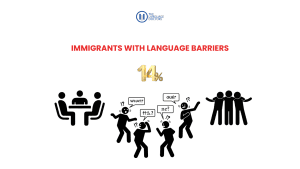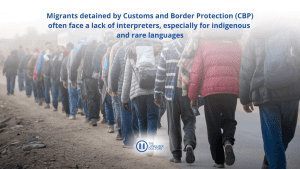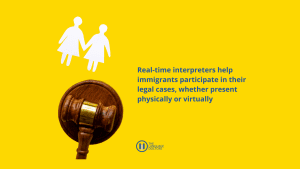Imagine navigating immigration, healthcare, and legal systems in a language you don’t fully understand—a reality for many immigrants in Washington, DC.
In a city as diverse as DC, the need for effective communication across languages is more critical than ever. With limited English proficiency, thousands face serious challenges accessing essential services.
We’ve used expert research to examine the impact of language barriers on DC’s immigrant community, explore where gaps exist, and offer solutions to help bridge the divide.
Understanding Language Barriers for Immigrants in Washington, DC

Washington, DC, is home to a vibrant immigrant community comprising 14% of the city’s population. The largest groups are from El Salvador, Ethiopia, and Mexico, introducing dozens of languages and dialects.
More than 14% of immigrants report limited English proficiency (LEP), meaning they cannot fully navigate complex systems in English. Accessing essential services—from healthcare to legal support—is difficult for thousands of residents. These challenges often stem from communication gaps, making navigating complex systems even more daunting.

Immigrant communication challenges in DC
Navigating the immigration system in DC is challenging enough; limited English skills make it even harder. Immigrants often face long, complicated processes involving visas, green cards, or asylum claims. When vital documents and proceedings are in English, these procedures become overwhelming for LEP individuals.
Many immigrants struggle to find multilingual legal aid, healthcare providers, or interpreters for daily tasks. Resources are available but limited.
The barriers are even steeper for those with rare languages or indigenous dialects. For example, migrants detained by US Customs and Border Protection (CBP) often encounter a lack of interpreters for indigenous languages, such as Mayan dialects like K’iche’ and Mam.
For these individuals, miscommunication isn’t just an inconvenience—it can derail their ability to fully participate in society and access opportunities.
How language barriers impact lives
Washington, DC’s language barriers isolate immigrants from local communities. These challenges lead to missed job opportunities and limit access to essential services, pushing people further into the margins.
According to the Ness Center, immigrants often encounter communication challenges that make daily interactions and accessing essential services difficult, adding to feelings of isolation and frustration.
These barriers are even more damaging in the immigration system. A single miscommunication can result in missed court hearings or incorrectly filed paperwork, leading to delays or denials. For example, asylum seekers unable to convey their stories in English often lose critical cases due to misinterpretation.
Gaps in Immigration System Language Access in DC
There are three stages where language and understanding are critical for immigrants:
- Detention and border encounters
- Immigration court hearings
- Application and asylum interviews
Migrants detained by Customs and Border Protection (CBP) often face a lack of interpreters, especially for indigenous and rare languages. CBP relies heavily on telephonic interpretation, often inadequate for nuanced or urgent conversation, creating immediate misunderstandings that can affect migrants’ legal and personal outcomes.

This lack of interpreters at the border is just the beginning. Interpreter shortages in immigration courts lead to delays with postponed cases, increasing the backlog in an already overwhelmed system. Inconsistent quality of interpretation is another issue, particularly for less common dialects. Misinterpretation during hearings can drastically alter a case’s outcome, leaving migrants at a disadvantage.
Asylum seekers face unique challenges during interviews. US Citizenship and Immigration Services (USCIS) does not provide interpreters for affirmative asylum interviews, requiring applicants to bring their own. This responsibility places a heavy burden on migrants, many of whom cannot afford professional services.
When USCIS does provide interpreters, they are often unfamiliar with regional dialects or cultural nuances, leading to errors that can jeopardize asylum claims.
These errors underscore deeper structural issues within the immigration system. Fragmented funding, poor coordination, and inconsistent interpreter availability leave many immigrants struggling to access the language support they need.
Structural challenges in language access for Washington, DC immigrants
The immigration system suffers from fragmented funding and poor coordination between agencies like DHS and DOJ. Language access is often treated as an afterthought, leaving interpreters and resources unevenly distributed.
For example, while some courts have full-time interpreters, others rely on ad hoc arrangements. This inconsistency creates barriers for LEP immigrants.
Providing professional interpretation services is expensive. Agencies often struggle to allocate funds for interpreters, especially for rare languages. Immigration courts, for instance, saw interpreter costs skyrocket from $17 million in 2017 to $110 million in 2019. Despite this, the demand continues to outpace supply, leaving immigrants underserved.
Remote interpretation, often via phone or video, is a typical stopgap measure. While cost-effective, it comes with limitations. Technical issues, poor audio quality, and the lack of personal connection can hinder effective communication.
These limitations are even more pronounced for speakers of rare or indigenous languages, where finding qualified interpreters is a significant challenge.
Unique challenges for rare languages
Speakers of rare or indigenous languages face the steepest challenges. These languages have few trained interpreters, most assigned to specific regions, so they’re difficult to access. The lack of resources forces courts and agencies to delay cases or rely on unqualified interpreters, leading to errors.
Languages often vary significantly by region, adding another layer of complexity. For example, the same word in one Mayan dialect may have a different meaning in another. The word “k’áak'” translates to “fire” in many Mayan dialects, but its pronunciation and meaning can vary across regions.
Variations in dialect can lead to critical misunderstandings in legal proceedings, where every word carries weight. Unfortunately, the immigration system often lacks the resources to address these nuances, leaving LEP immigrants at a disadvantage.
The complexity of these issues underscores the urgent need for effective language solutions. Bridging these gaps can empower immigrants to navigate legal, healthcare, and educational systems confidently.
Solutions to Language Barriers for Immigrants in DC
For immigrants navigating complex legal, healthcare, or educational systems, trained interpreters bridge the gap between languages and cultures. These services ensure that non-English speakers fully understand their rights and responsibilities, whether in a courtroom, a hospital, or during an asylum interview.
Certified interpreters also reduce errors that could lead to missed court dates or improperly filed documents. In sensitive cases, such as immigration or public health emergencies, having an interpreter can mean the difference between success and failure.
Case studies highlight how professional interpreters save time, reduce costs, and improve communication by delivering accurate, culturally appropriate interpretations.
The benefits of certified interpreters are clear, especially in high-stakes scenarios like immigration. By improving access to interpretation services, we can ensure immigrants fully understand their rights and responsibilities at every stage.
Improving immigration experiences with interpreters in DC
Providing on-site and remote interpretation services is a practical way to improve language barriers. Real-time interpreters help immigrants participate in their legal cases, whether present physically or virtually. Simultaneous and consecutive interpretation ensures that non-English speakers don’t miss any nuances or details.

For example, in a US court case, a defendant’s conviction was overturned because the court interpreter mistranslated key testimony, violating the defendant’s rights.
Immigration forms, notices of hearings, and policy documents must be available in multiple languages to eliminate confusion. Multilingual resources also help reduce backlogs by enabling immigrants to complete forms correctly the first time. High-quality translation ensures that every word carries the same legal weight and cultural relevance.
Achieving translation precision requires a broader commitment to multilingual support. Fostering collaboration and expanding resources in Washington, DC, can better address the diverse language needs of its immigrant communities.
How to build multilingual support for DC immigrants
Expanding multilingual support for DC immigrants requires collaboration between government, nonprofits, and private agencies. Public sector initiatives can enhance access by funding more interpreters and translators, especially for rare languages. Additionally, government agencies should prioritize building comprehensive databases of certified interpreters available for immediate deployment.
Language workshops or localized translation services for specific immigrant groups can also fill gaps where government services fall short. Partnering with libraries, schools, and cultural centers can provide immigrants with practical tools to overcome language challenges. Building these networks ensures that immigrants, regardless of their native tongue, have equal opportunities to succeed.
While building these networks is essential, choosing qualified, professional language experts ensures accurate and trustworthy communication.
Washington DC Interpreter Tips
Choosing the right interpreter is key to breaking down language barriers effectively. Beyond language fluency, professionalism, and cultural understanding make all the difference in high-stakes situations.
When hiring an interpreter in DC, we recommend focusing on qualifications, impartiality, and confidentiality. Certified interpreters provide the expertise required to facilitate accurate, reliable communication. For example, at The Language Doctors, we only hire interpreters and translators certified by one of the three leading organizations:
- American Translators Association (ATA)
- National Association of Judiciary Interpreters and Translators (NAJIT)
- Institute of Translation and Interpreting (ITI)
Hiring language experts certified by one of these organizations ensures they meet industry standards. We also stipulate a minimum of five years of experience to guarantee our clients the best service.
Fluency in specific dialects is just as critical as general language proficiency. Dialectal differences can make or break clear communication in sensitive cases. Always confirm that the interpreter understands cultural nuances, as this minimizes misunderstandings.
Ethical practices are non-negotiable at The Language Doctors. Interpreters should maintain strict confidentiality, especially in legal and medical cases. Impartiality is critical to ensure fairness in immigration proceedings. Avoid interpreters who inject personal opinions or fail to stay neutral during sensitive discussions.
Common mistakes to avoid
Even with good intentions, relying on unqualified interpreters can lead to serious mistakes. Avoiding these common pitfalls is critical for ensuring accurate and effective communication.
Untrained family members or friends may seem convenient and cost-effective, but they lack the professional skills needed for accuracy. Emotional involvement or limited vocabulary can lead to errors that harm outcomes, particularly in legal or medical situations.
Another pitfall is overreliance on automated translation tools. While Google Translate and AI tools are helpful for casual use, they lack the nuance and precision required for official or high-stakes scenarios. Professional interpreters understand the context and cultural differences, which machines cannot replicate.

Look for transparent pricing
Expertise and reliability matter, but pricing transparency is equally important. Hidden fees and limited service options derail even the best efforts, making choosing an agency that offers transparent and flexible solutions crucial.
At The Language Doctors, we use transparent, pay-per-use billing. Many clients switching to our services complain about the hidden fees charged by other providers, so be aware when comparing services offered by interpreter agencies in DC.
Look for agencies that provide various interpretation solutions, such as in-person, telephonic, and video services. Ensure the agency can accommodate specific needs, including rare languages or specialized contexts like immigration hearings.
Why Choose The Language Doctors
With over 25 years of experience, The Language Doctors has a proven track record in providing interpreter services for immigrants in DC and across the United States, working directly with USCIS and the DOJ.
We are a GSA Schedule Holder and an ISO 17100 Certified translation agency. We ensure our clients get accurate, reliable services while adhering to the strictest governance and protocols.
The Language Doctors has a network of over 2,000+ language experts globally, including rare dialects and American Sign Language. Clients can use our Connected Care© platform to instantly connect with interpreters and translators 24/7 or book an on-site interpreter anywhere in the United States within 24 hours.
Empower DC’s immigrant community by eliminating language barriers with The Language Doctors. Connect with a language expert and find a communication solution today.


